Mises, Ludwig von. Human Action: A Treatise on Economics
Подождите немного. Документ загружается.

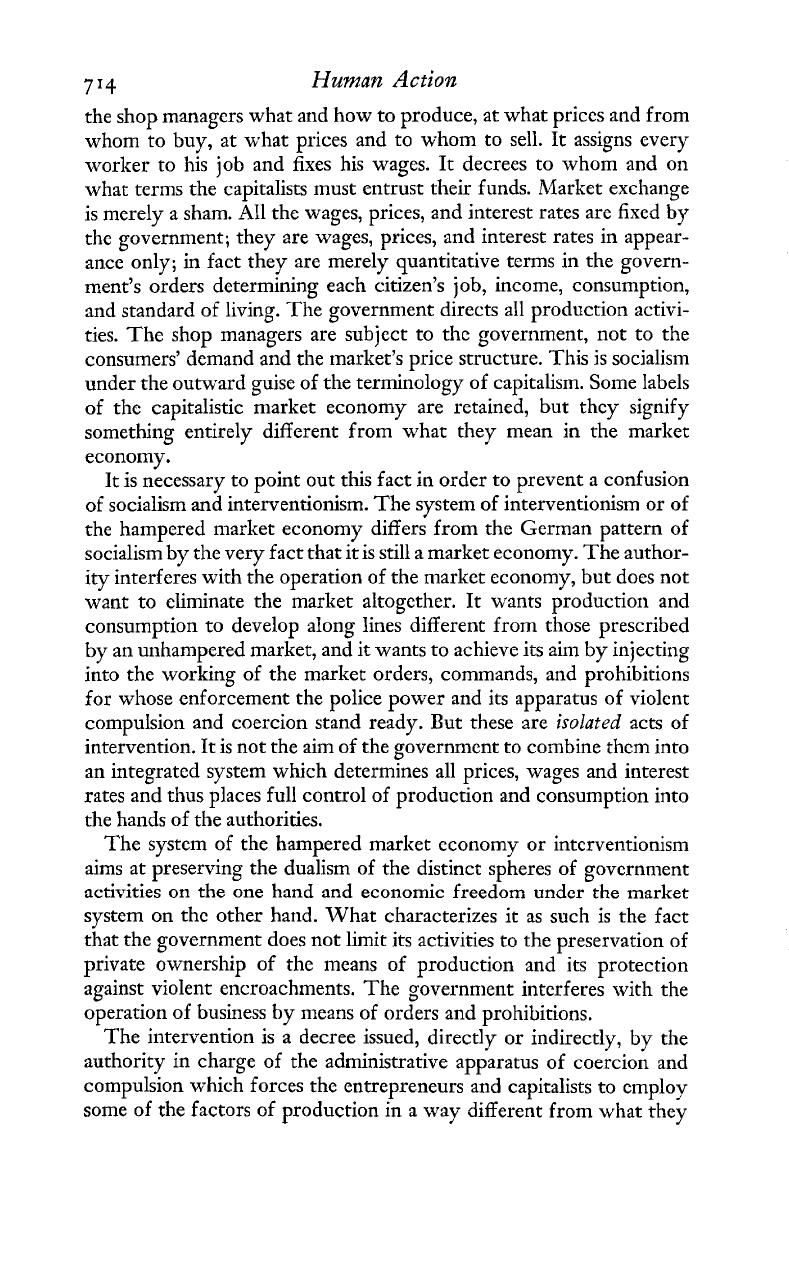
714
Human
Action
the shop managers what and how to produce, at what prices and from
whom to buy, at what prices and to whom to sell. It assigns every
worker to his job and fixes his wages. It decrees to whom and on
what terms the capitalists must entrust their funds. Market exchange
is merely a sham. AIl the wages, prices, and interest rates are fixed
by
the government; they are wages, prices, and interest rates in appear-
ance only; in fact they are merely quantitative terms in the govern-
ment's orders determining each citizen's job, income, consumption,
and standard of living. The government directs all production activi-
ties. The shop managers are subject to the government, not to the
consumers' demand and the market's price structure. This is socialism
under the outward guise of the terminology of capitalism. Some labels
of the capitalistic market economy are retained, but they signify
something entirely different from what they mean in the market
economy.
It is necessary to point out this fact in order to prevent a confusion
of socialism and interventionism. The system of interventionism or of
the hampered market economy differs from the German pattern of
socialism by the very fact that it is still a market economy. The author-
ity interferes with the operation of the market economy, but does not
want to eliminate the market altogether. It wants production and
consumption to develop aIong lines different from those prescribed
by an unhampered market, and it wants to achieve its aim by injecting
into the working of the market orders, commands, and prohibitions
for whose enforcement the police power and its apparatus of violent
compulsion and coercion stand ready. But these are
isolated
acts of
intervention. It is not the aim of the government to combine them into
an integrated system which determines all prices, wages and interest
rates and thus places full control of production and consumption into
the hands of the authorities.
The system of the hampered market economy or interventionism
aims at preserving the dualism of the distinct spheres of government
acdvities en
the
one
hand am! ecenemic
freedem
uxdcr
the
mzrket
system on the other hand. What characterizes it as such is the fact
that the government does not limit its activities to the preservation of
private ownership of the means of production and its protection
against violent encroachments. The government interferes with the
operation of business by means of orders and prohibitions.
The intervention is a decree issued, directly or indirectly, by the
authority in charge of the administrative apparatus of coercion and
compulsion which forces the entrepreneurs and capitalists to employ
some of the factors of production in a way different from what they
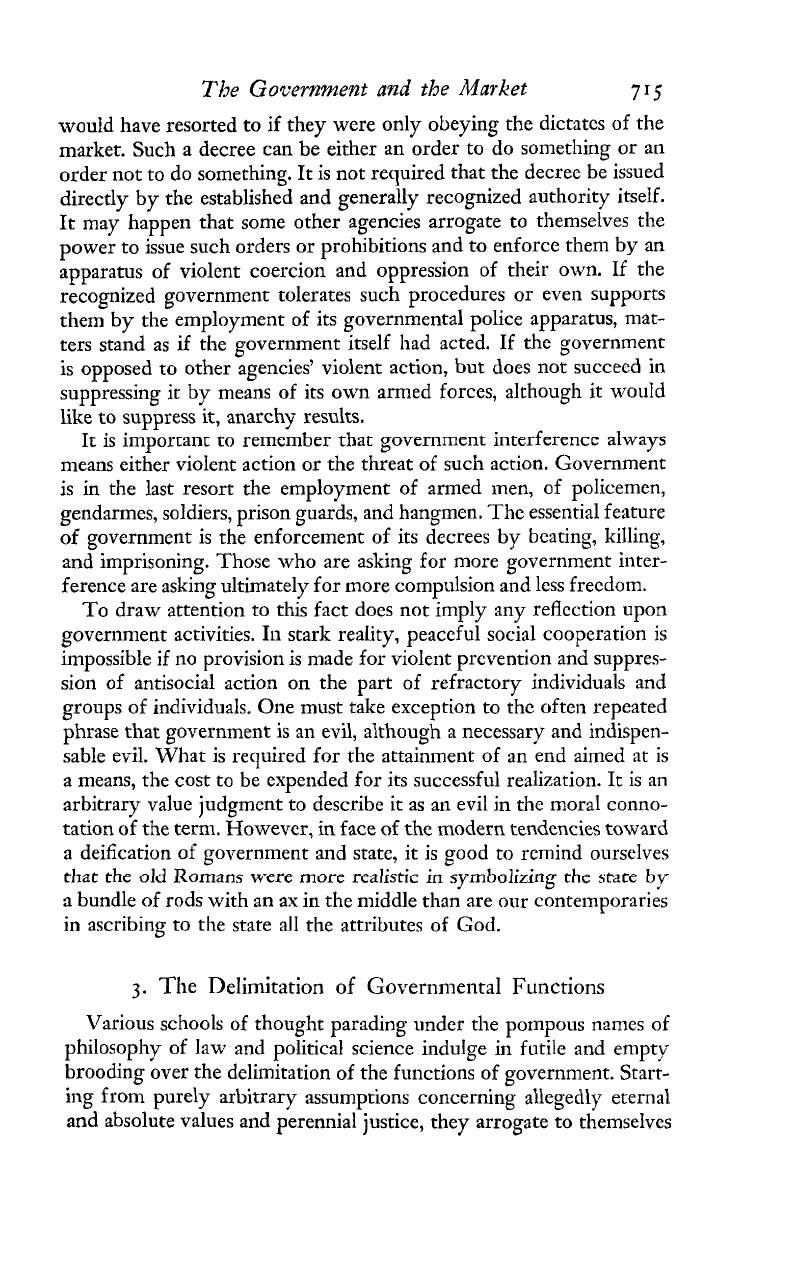
The
Government
and
the
Market
715
would have resorted to if they were only obeying the dictates of the
market. Such
a
decree can be either an order to do something or an
order not to do something. It is not required that the decree be issued
directly by the established and generally recognized authority itself.
It
may happen that some other agencies arrogate to themselves the
power to issue such orders or prohibitions and to enforce them by an
apparatus of violent coercion and oppression of their own. If the
recognized government tolerates such procedures or even supports
them by the employment of its governmental police apparatus, mat-
ters stand as if the government itself had acted. If the government
is opposed to other agencies' violent action, but does not succecd in
suppressing it by means of its own armed forces, although it wouId
like to suppress it, anarchy
results.
It is important to remember that government interference always
means either violent action or the threat of such action. Government
is in the last resort the employment of armed men, of policemen,
gendarmes, soldiers, prison guards, and hangmen. The essential feature
of government is the enforcement of its decrees by beating, killing,
and imprisoning. Those who are asking for more government inter-
ference are asking ultimately for more compulsion and less freedom.
To draw attention to this fact does not imply any reflection upon
government activities.
In
stark reality, peaceful social cooperation is
impossible if no provision is made for violent prevention and suppres-
sion of antisocial action on the part of refractory individuals and
groups of individuals. One must take exception to the often repeated
phrase that government is an evil, although a necessary and indispen-
sable evil. What is required for the attainment of an end aimed at is
a means, the cost to be expended for its successful realization. It is
an
arbitrary value judgment to describe it as an evil in the moral conno-
tation of the term. However,
in
face of the modern tendencies toward
a deification of government and state, it is good to remind ourselves
that the old Romans were more realistic in symbolizing the state by
a bundle of rods with an ax in the middle than are our contemporaries
in
ascribing to the state all the attributes of God.
3.
The Delimitation
of
Governmental Functions
Various schools of thought parading under the pompous names of
philosophy of law and political science indulge in futile and empty
brooding over the delimitation of the functions of government. Start-
ing from purely arbitrary assumptions concerning allegedly eternal
and absolute values and perennial justice, they arrogate to themselves
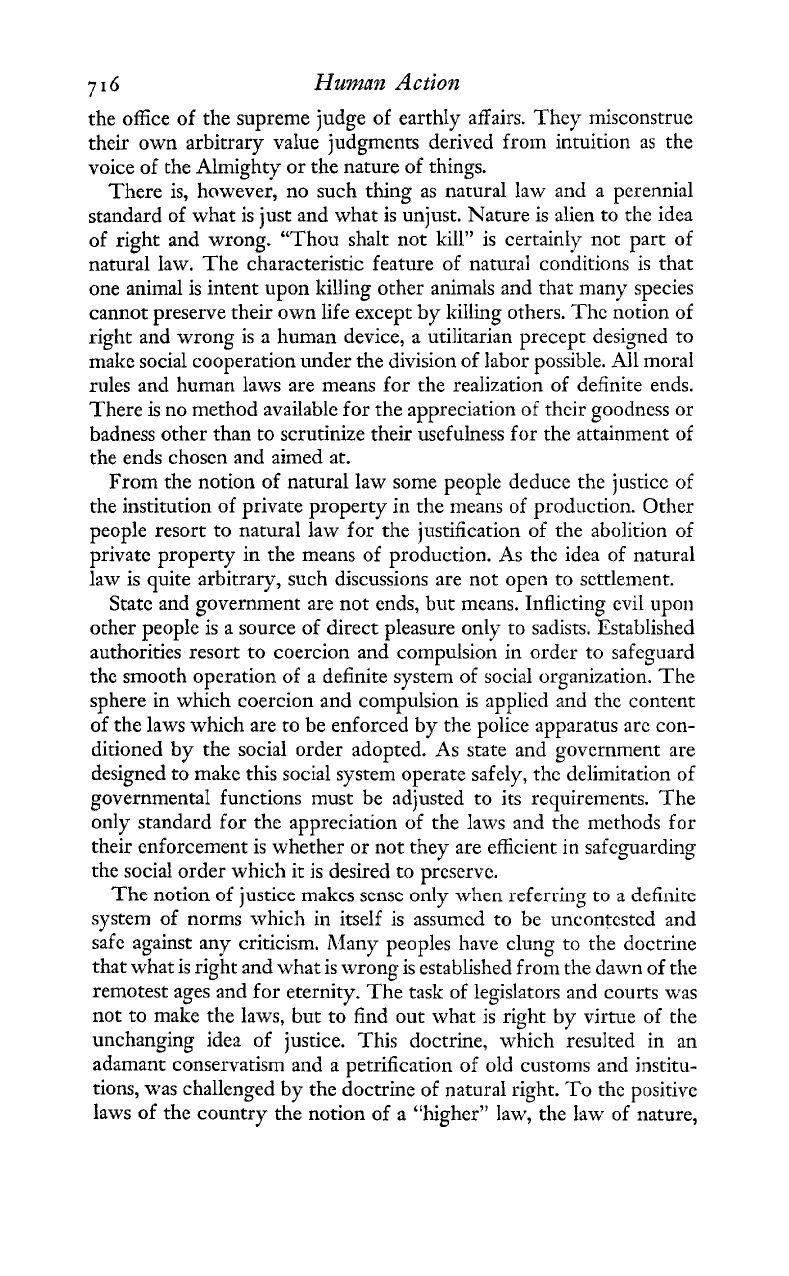
716
Human
Action
the office of the supreme judge of earthIy affairs. They misconstrue
their own arbitrary value judgments derived from intuition as the
voice of the Almighty or the nature of things.
There is, however, no such thing as natural law and a perennial
standard of what is just and what is unjust. Nature is alien to the idea
of right and wrong. "Thou shalt not kill" is certainly not part of
natural law. The characteristic feature of natural conditions is that
one animal is intent upon killing other animals and that many species
cannot preserve their own life except by killing others. The notion of
right and wrong is a human device, a utilitarian precept designed to
make social cooperation under the division of labor possible. All moral
rules and human laws are means for the realization of definite ends.
There is no method available for the appreciation of their goodness or
badness other than to scrutinize their usefulness for the attainment of
the ends chosen and aimed at.
From the notion of natural law some people deduce the justice of
the institution of private property in the means of production. Other
people resort to natural law for the justification of the abolition of
private property in the means of production. As the idea of natural
law is quite arbitrary, such discussions are not open to settlement.
State and government are not ends,
but
means. Inflicting evil upon
other people is a source of direct pleasure only to sadists. Established
authorities resort to coercion and compulsion in order to safeguard
the smooth operation of a definite system of social organization. The
sphere in which coercion and compulsion is applied and the content
of the laws which are to be enforced by the police apparatus arc con-
ditioned by the social order adopted. As state and government are
designed to make this social system operate safely, the delimitation of
governmental functions must be adjusted to its requirements. The
only standard for the appreciation of the laws and the methods for
their enforcement is whether or not they are emcicnt in safeguarding
the social order which it is desired to prcscrve.
TL-
---:--
-f
:.-..L--
--I--
--
I-.....--
J-C-!..-
I
IIG llULlUll Ul JUbLICC IlldKLS SCllSL UlllY WIICIl iClGlllll~ LU
';I
UGILIllLI~
system of norms which in itself is assumed to be uncontested and
safe against any criticism. Many peoples have clung to the doctrine
that what is right and what
is
wrong is established from the dawn of the
remotest ages and for eternity. The task of legislators and courts was
not to make the laws, but to find out what is right by virtue of the
unchanging idea of justice. This doctrine, which resulted in an
adamant conservatism and a petrification of old customs and jnstitu-
tions, was challenged by the doctrine of natural right. To the positive
laws of the country the notion of a "higher" law, the law of nature,
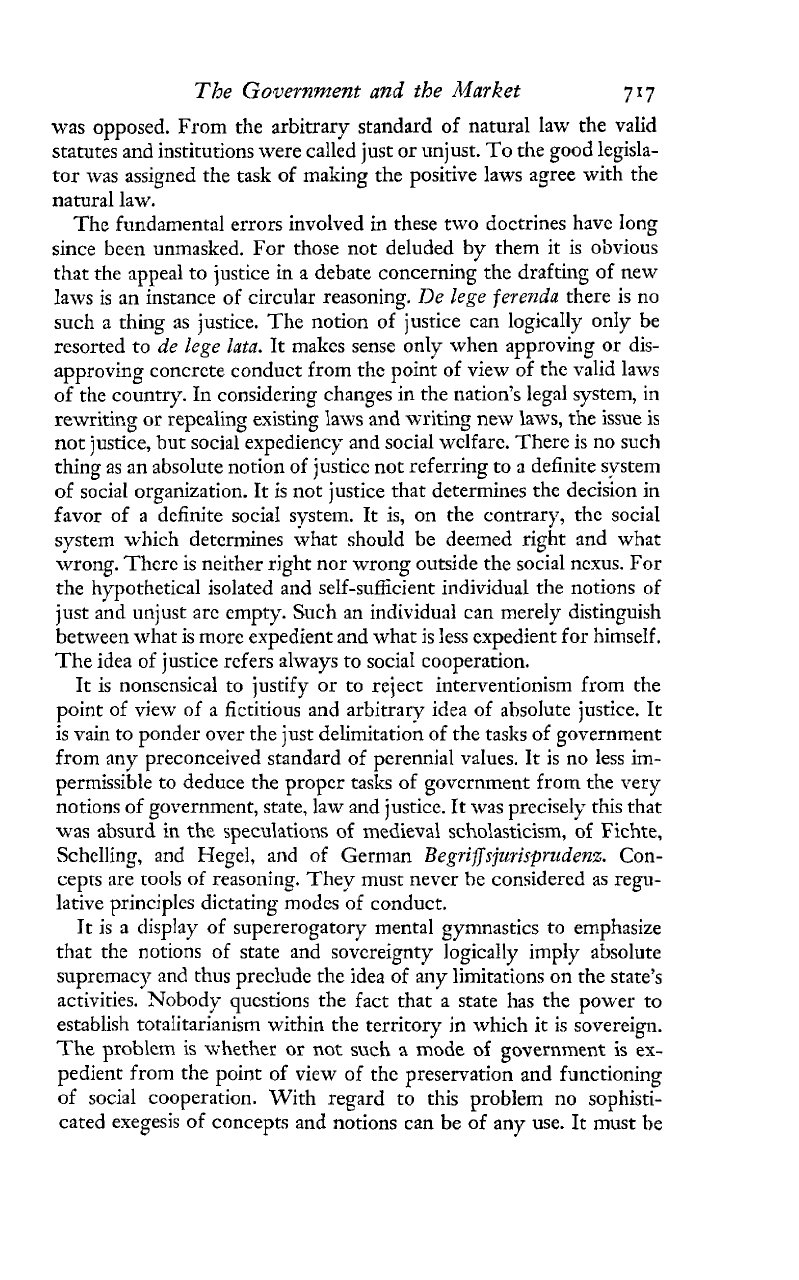
The Go,vernnzent and the Market
7'7
was opposed. From the arbitrary standard of natural law the valid
statutes and institutions were called just or unjust. To the good legisla-
tor was assigned the task of making the positive laws agree with the
natural law.
The fundamental errors involved in these two doctrines havc long
since bccn unmasked. For those not deluded by them it is obvious
that the appeal to justice in a debate concerning the drafting of new
laws is an instance of circular reasoning.
Ile lege
ferenda
there is no
such a thing as justice. The notion of justice can logicaIly onIy be
resorted to
de lege
lata.
It makes sense only when approving or dis-
approving concrcte conduct from thc point of view of the valid laws
of the country. In considering changes in the nation's legal system, in
rewriting or repealing existing law and writing new laws, the issue is
not justice, but social expediency and social wclfarc. Therc is no
such
thing as an absolute notion of justicc not referring to a definite system
of social organization. It is not justice that determines the decision in
favor of
a
definite socia1 system. It is, on the contrary, the social
system which detcrmines what should be deemed right and what
wrong. Thcrc is neither right nor wrong outside the social ncxus. For
the hypothetical isolated and self-sufficient individual the notions of
just and unjust arc cmpty. Such an individual can merely distinguish
between what is more expedient and what is less expedient for himseIf.
The idea of justice refers always to socia1 cooperation.
It is nonsensical to justify or to reject interventionism from the
point of view
of
a fictitious and arbitrary idea of absolute justice. It
is vain to ponder over the just delimitation of the tasks of government
from any preconceived standard of perennial values. It is no less im-
permissible to deduce the proper tasks of govcrnment from the very
notions of government, state, law and justice.
It
was precisely this that
was absurd
in
the
speculations
of
medieval
scholasticism, of Fichte,
Schelling, and Hegel, and of German
Begrifl'sjz~~ispn~denz.
Con-
ceprs are tools
of
reasoning. They must never he considered as rep-
lative principlcs dictating modes of conduct.
It is a display of supererogatory mental gymnastics to emphasize
that the notions of state and sovereignty logically imply absolute
supremacy and thus preclude the idea of any limitations on the state's
activities. Xobody
questions
the fact that a state has the power to
establish totalitarianism within the territory in which it
is
sovereign.
The
problem is
whether
or not such
a
mode of
government
is ex-
pedient from the point of view of the preservation and functioning
of social cooperation. With regard to this problem no sophisti-
cated exegesis of concepts and notions can be of any use. It must be
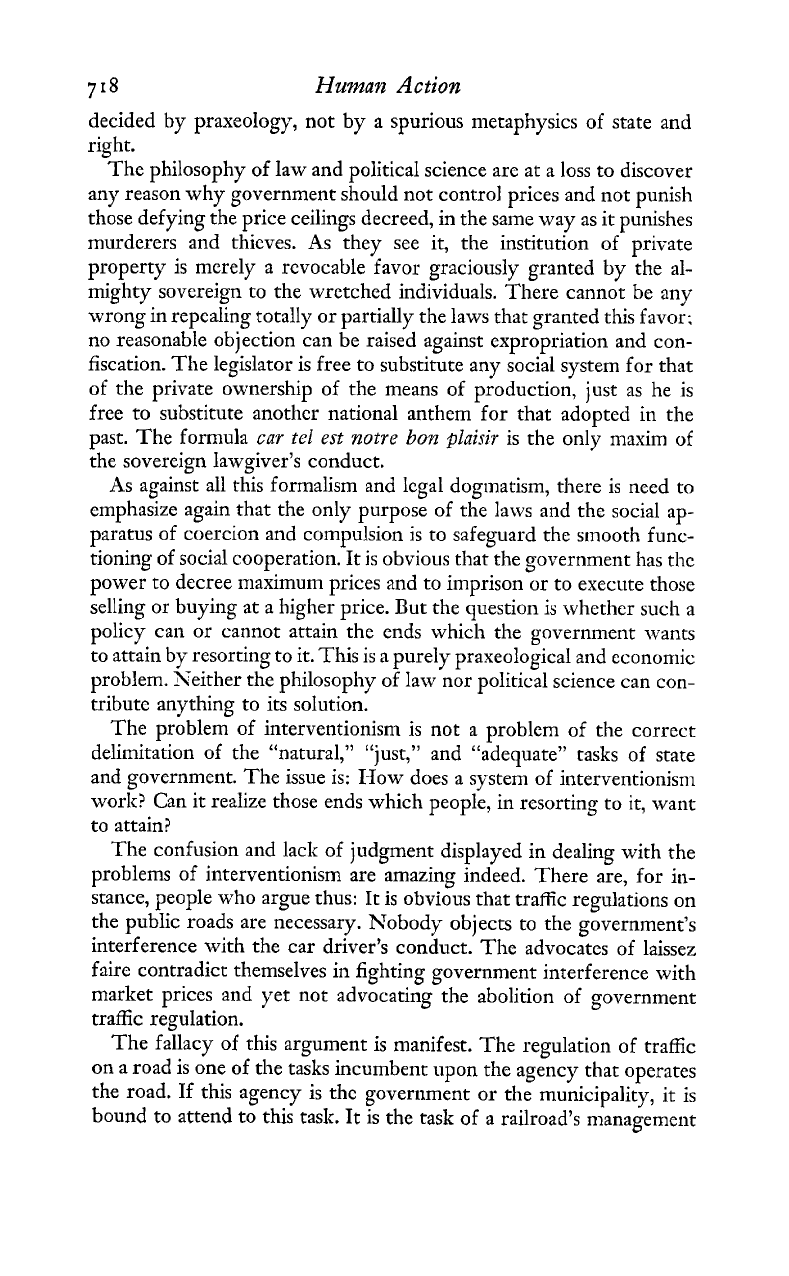
718
Human
Action
decided by praxeology, not by a spurious n~etaphysics of state and
right.
The philosophy of law and political science arc at a loss to discover
any reason why government should not control prices and not punish
those defying the price ceilings decreed, in the same way as it punishes
murderers and thieves. As they see it, the institution of private
property is merely a revocable favor graciously granted by the al-
mighty sovereign to the wretched individuals. There cannot be any
wrong in repealing totally or partially the laws that granted this favor;
no reasonable objection can be raised against cxpropriation and con-
fiscation. The legislator is free to substitute any social system for that
of the private ownership of the means of production, just as he is
free to substitute another national anthem for that adopted
in
the
past. The formula
car
tcl
est
notre
bun
plaisir
is the only maxim of
the sovereign lawgiver's conduct.
As against all this formalism and legal dogmatism, there is need to
emphasize again that the only purpose of the laws and the social ap-
paratus of coercion and compulsion is to safeguard the smooth func-
tioning of social cooperation. It js obvious that the government has the
power to decree maximum prices and to imprison or to execute those
selling or buying at a higher price. But the question is whcther such a
policy can or cannot attain the ends which the government wants
to attain by resorting to it. This is a purely praxeological and economic
problem. Seither the philosophy of law nor political science can con-
tribute
anything to its solution.
The problem of interventionism is not a problcm of the correct
delimitation of the "natural," "just," and "adequate" tasks of state
and government. The issue is: How does a system of interventionism
work? Can it realize those ends which people,
in
resorting to it, want
to attain?
The confusion and lack of judgment displayed in dealing with the
problems of interventionism are amazing indeed. There are, for in-
stance, peopie who argue thus: it is obvious that traffic reguiations on
the public roads are necessary. Nobody objects to the government's
interference with the car driver's conduct. The advocates of laissez
fairc contradict themselves in fighting government interference with
market priccs and yet not advocating the abolition of government
traffic regulation.
The fallacy of this argument is manifest. The regulation of traffic
on a road is one of the tasks incumbent upon the agency that operates
the road. If this agency is the government or the municipality, it is
bound to attend to this task. It is the task of a railroad's management
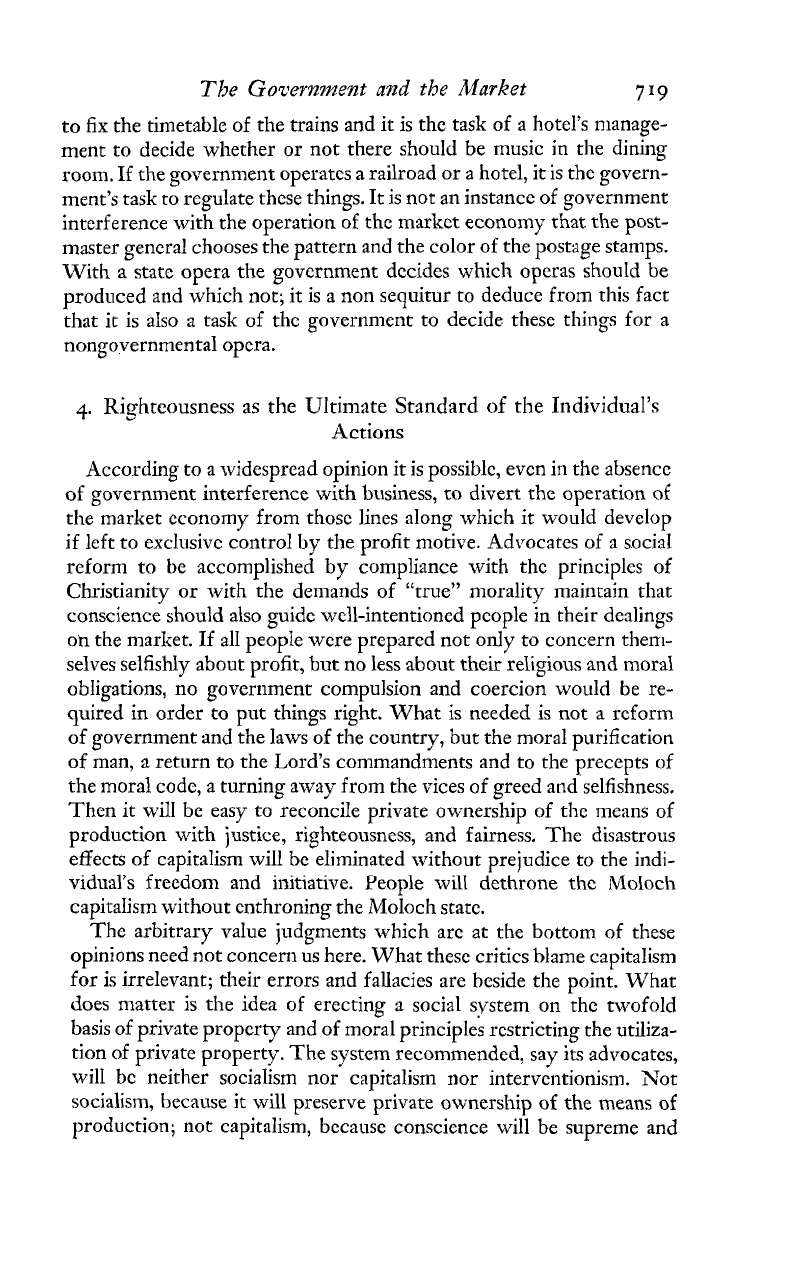
The Goz~ernment
and
the Market
719
to
fix
the timetable of the trains and it is the task of a hotel's nianage-
ment to decide whether or not there should be music in the dining
room. If the government operates a railroad or a hotel, it is the govern-
ment's task to regulate these things. It is not an instance of government
interference with the operation of the market economy that the post-
master general chooses the pattern and the color of the postage stamps.
With a state opera the government decides which operas should be
produced and which not; it is a non sequitur to deduce from this fact
that it is also a task of the government to decide these things for a
nongovernmental opera.
4.
Righteousness as the Ultimate Standard
of
the Irzdividual's
Actions
According to a widespread opinion it is possible, even in the absence
of government interference with business, co divert the operation
of
the market economy from those lines aloncr which it would develop
if left to exclusive control
by
the ~rofit motive. Advocates of a social
reform to be accomplished by compliance with the principles of
Christianity or with the demands of "true" morality maintain that
conscience should also guide well-intentioned people in their dealings
oh the market. If a11 peopIe were prepared not only to concern them-
selves selfishly about profit, but no less about thcir religious and moral
obligations, no government compulsion and coercion would be re-
quired in order to put things right. What is needed is not a reform
of government and the laws of the country, but the moral purification
of man, a return to the Lord's commandments and to the precepts of
the moral code, a turning away from the vices of greed and selfishness.
Then it wilI be easy to reconcile private ownership of the means of
production with justice, righteousness, and fairness. The disastrous
effects of capitalism will be eliminated without prejudice to the indi-
vidnal's freedom and initiative. People
will
dethrone the Moloch
capitalism without enthroning the Moloch state.
The arbitrary value judgments which arc at the bottom of these
opinions need not concern us here. What these critics blame capitalism
for is irrelevant; their errors and fallacies are beside the point. What
does matter is the idea of erecting
a
social system on the twofold
basis of private property and of moral principles restricting the utiliza-
tion
of
private property. The system recommended. say its advocates,
wilI be neither socialism nor capitalism nor intervdntionisrn. Not
socialism, because
it
will preserve private ownership of the means of
production; not capitalism, because conscience will be supreme and
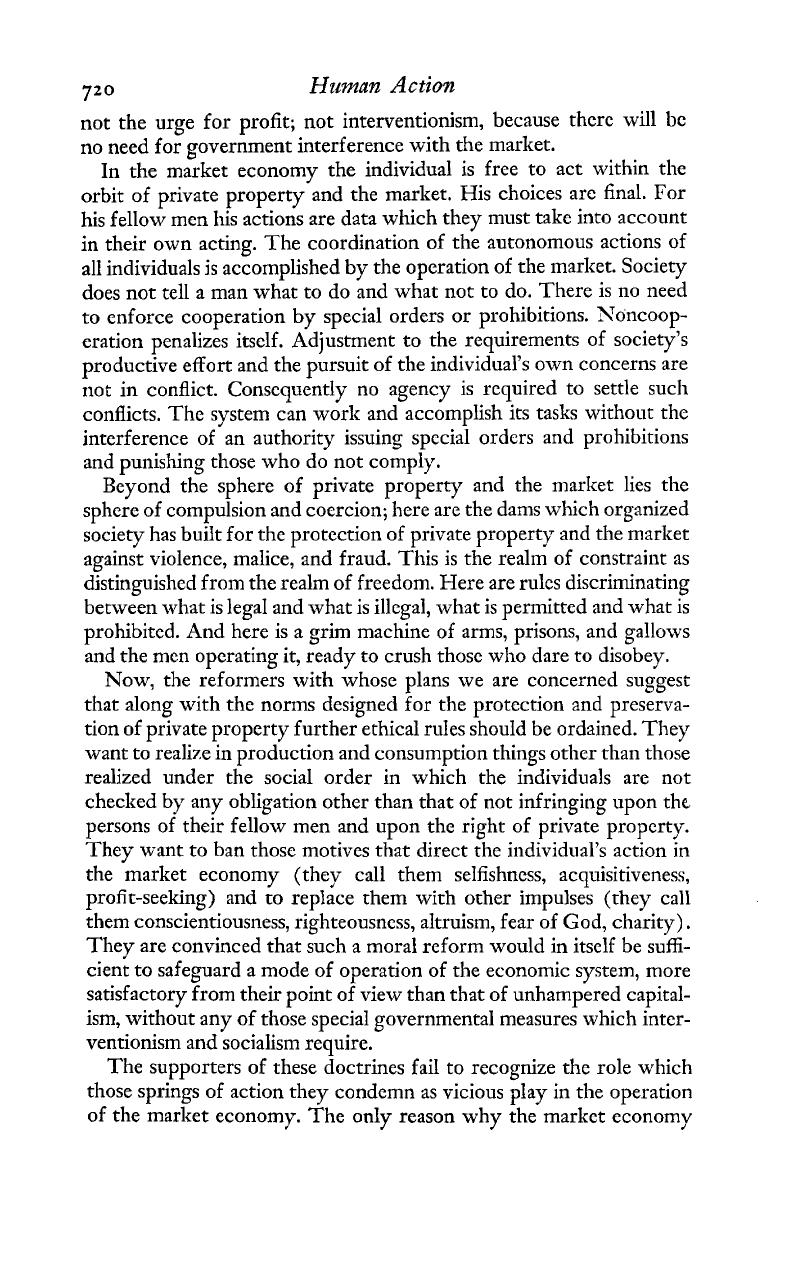
720
Hz~man
Action
not the urge for profit; not interventionism, because there will be
no need for government interference with the market.
In the market economy the individual is free to act within the
orbit of private property and the market. His choices are final. For
his fellow men his actions are data which they must take into account
in their own acting. The coordination of the autonomous actions of
all individuals is accomplished by the operation of the market. Society
does not tell a man what to do and what not to do. There is no need
to enforce cooperation by special orders or prohibitions. Noncoop-
eration penalizes itself. Adjustment to the requirements of society's
productive effort and the pursuit of the individual's own concerns are
not in conflict. Consequently no agency is required to settle such
conflicts. The system can work and accomplish its tasks without thc
interference of an authority issuing special orders and prohibitions
and punishing those who do not comply.
Beyond the sphere of private property and the market lies the
sphere of compulsion and coercion; here are the dams which orgmized
society has built for the protection of private property and the market
against violence, malice, and fraud. This is the realm of constraint as
distinguished from the realm of freedom. Here are rulcs discriminating
between what is legal and what is illegal, what is permitted and what is
prohibitcd. And here is a grim machine of arms, prisons, and gallows
and the men operating it, ready to crush those who dare to disobey.
Now, the reformers with whose plans we are concerned suggest
that along with the norms designed for the protcction and preserva-
tion of private property further ethical rules should be ordained. They
want to realize in production and consumption things other than those
realized under the social order in which the individuals are not
checked by any obligation other than that of not infringing upon the
persons of their fellow men and upon the right of private property.
They want to ban those motives that direct the individual's action in
the market economy (they call them selfishness, acquisitiveness,
profit-seekingj and to repiace them with other impuises (they caii
them conscientiousness, righteousness, altruism, fear of God, charity).
They are convinced that such a moral reform would in itself be suffi-
cient to safeguard a mode of operation of the economic system, more
satisfactory from their point of view than that of unhampered capital-
ism, without any of those special governmental measures which inter-
ventionism and socialism require.
The supporters of these doctrines fail to recognize the role which
those springs of action they condemn as vicious play in the operation
of the market economy. The only reason why the market economy
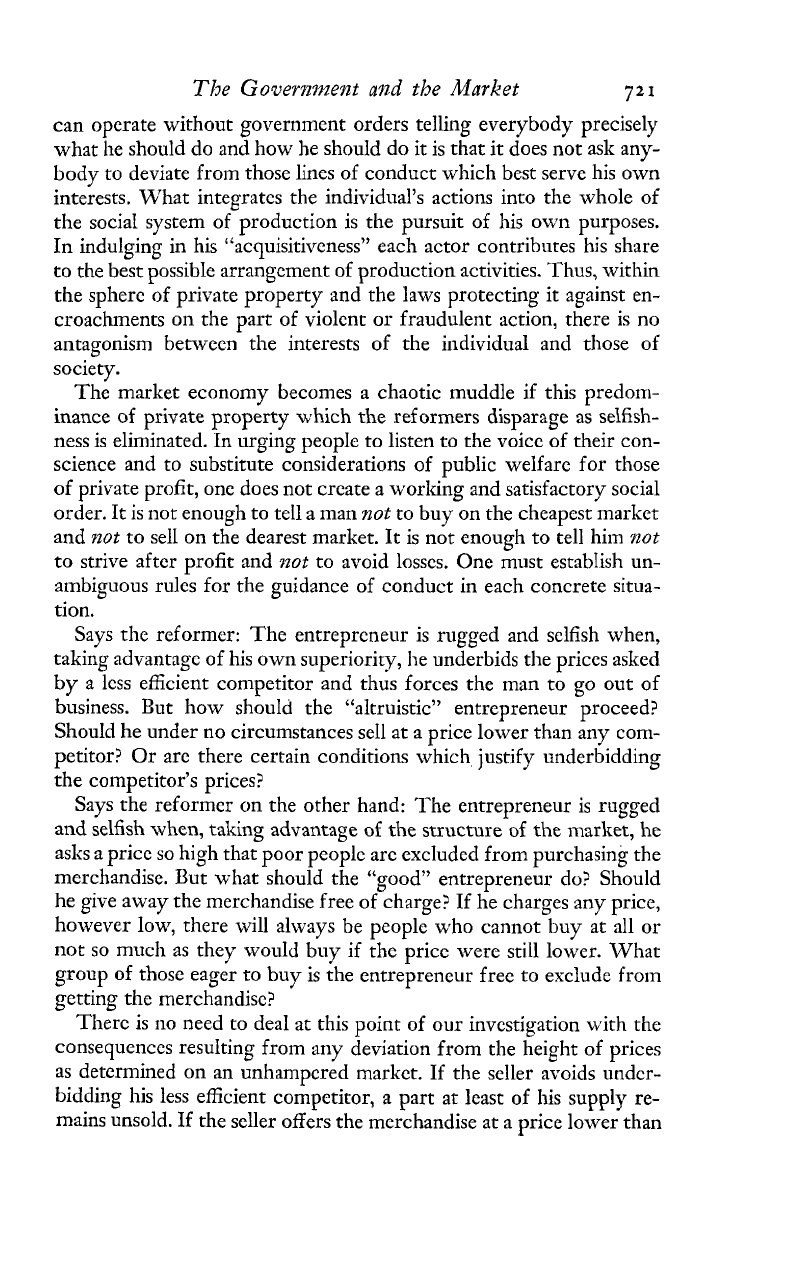
The
Government
and
the
Market
721
can operate without government orders telling everybody precisely
what he should do and how he should do it is that it does not ask any-
body to deviate from those lines of conduct which best serve his own
interests. What integrates the individual's actions into the whole of
the socia1 system of production is the pursuit of his own purposes.
In indulging in his "acquisitiveness" each actor contributes his share
to the best possible arrangement of production activities. Thus, within
the sphere of private property and the laws protecting it against en-
croachments on the part of violent or fraudulent action, there is no
antagonism between the interests of the individual and those of
society.
The market economy becomes a chaotic muddle if this predom-
inance of private property which the reformers disparage as selfish-
ness is eliminated.
In
urging peoplc to listen to the voice of their con-
science and to substitute considerations of public welfare for those
of private profit, one does not create a working and satisfactory social
order. It is not enough to tell
a
man
not
to buy on the cheapest market
and
not
to sell on the dearest market. It is not enough to tell hiin
not
to strive after profit and
not
to avoid losses. One must estabIish un-
ambiguous rules for the guidance of conduct in each concrete situa-
tion.
Says the reformer: The entrepreneur is rugged and selfish when,
taking advantage of his own superiority, he underbids the prices asked
by a less efficient competitor and this forces the man to go out of
business. But how should the "altruistic" entrepreneur proceed?
Should he under no circumstances sell at a price lower than any com-
petitor? Or are there certain conditions which justify underbidding
the competitor's prices?
Says the reformer on the other hand: The entrepreneur is rugged
and selfish
when,
taking advantage of the structure of the market, he
asks a price so high that poor peoplc are excluded from purchasing the
merchandise. But what should the "good" entrepreneur do? Should
he give away the merchandise free of charge? If he charges any price,
however low, there will always be peoplc who cannot buy at all or
not so much as they would buy if the price were still lower. What
group
of
those eager to buy is the entrepreneur free to exclude from
getting the merchandise?
There is no need to deal at this point of our investigation with the
consequences resulting from any deviation from the height of prices
as determined on an unhampered market. If the seller avoids undcr-
bidding his less efficient competitor,
a
part at least of his supply re-
mains unsold. If the seller offers the merchandise at a price lower than
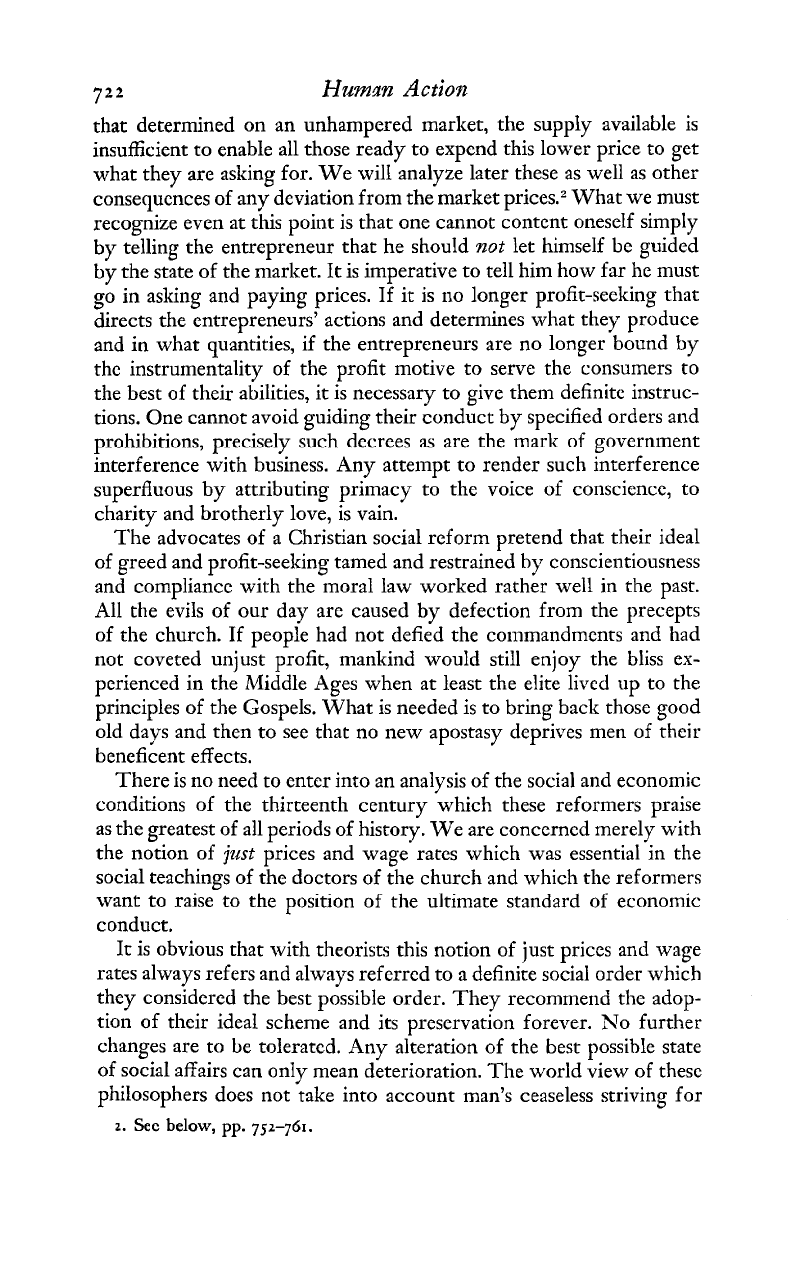
Human
Action
that determined on an unhampered market, the supply available is
insufficient to enable all those ready to expend this lower price to get
what they are asking for. We will analyze later these as well as other
consequences of any deviation from the market prices.What we must
recognize even at this point is that one cannot content oneself simply
by telling the entrepreneur that he should
not
let himself be guided
by
the state of the market. It is imperative to tell him how far he must
go in asking and paying prices. If it is no longer profit-seeking that
directs the entrepreneurs' actions and determines what they produce
and in what quantities, if the entrepreneurs are no longer bound by
the instrumentality of the profit motive to serve the consumers to
the best of their abilities, it is necessary to give them definite instruc-
tions. One cannot avoid guiding their conduct by specified orders and
prohibitions, precisely such decrees
as
are the mark of government
interference with business. Any attempt to render such interference
supertluous by attributing primacy to the voice of conscience, to
charity and brotherly love, is vain.
The advocates of a Christian social reform pretend that their ideal
of greed and profit-seeking tamed and restrained by conscientiousness
and compliance with the moral law worked rather well in the past.
All the evils of our day are caused by defection from the precepts
of the church. If people had not defied the commandments and had
not coveted unjust profit, mankind would stiIl enjoy the bliss ex-
perienced in the Middle Ages when at least the elite lived
up
to the
principles of the Gospels. What is needed is to bring back those good
old days and then to see that no new apostasy deprives men of their
beneficent effects.
There is no need to enter into an analysis of the social and economic
conditions of the thirteenth century which these reformers praise
as the greatest of all periods of history. We are concerned merely with
the notion of
just
prices and wage rates which was essential in the
social teachings of the doctors of the church and which the reformers
want to ralse to the position of the ultimate standard of economic
conduct.
It is obvious that with theorists this notion of just prices and wage
rates always refers and always referred to a definite social order which
they considered the best possible order. They recommend the adop-
tion of their ideal scheme and its preservation forever. No further
changes are to be tolerated. Any alteration of the best possible state
of social affairs can only mean deterioration. The world view of these
philosophers does not take into account man's ceaseless striving for
2.
See
below,
pp.
752-761.
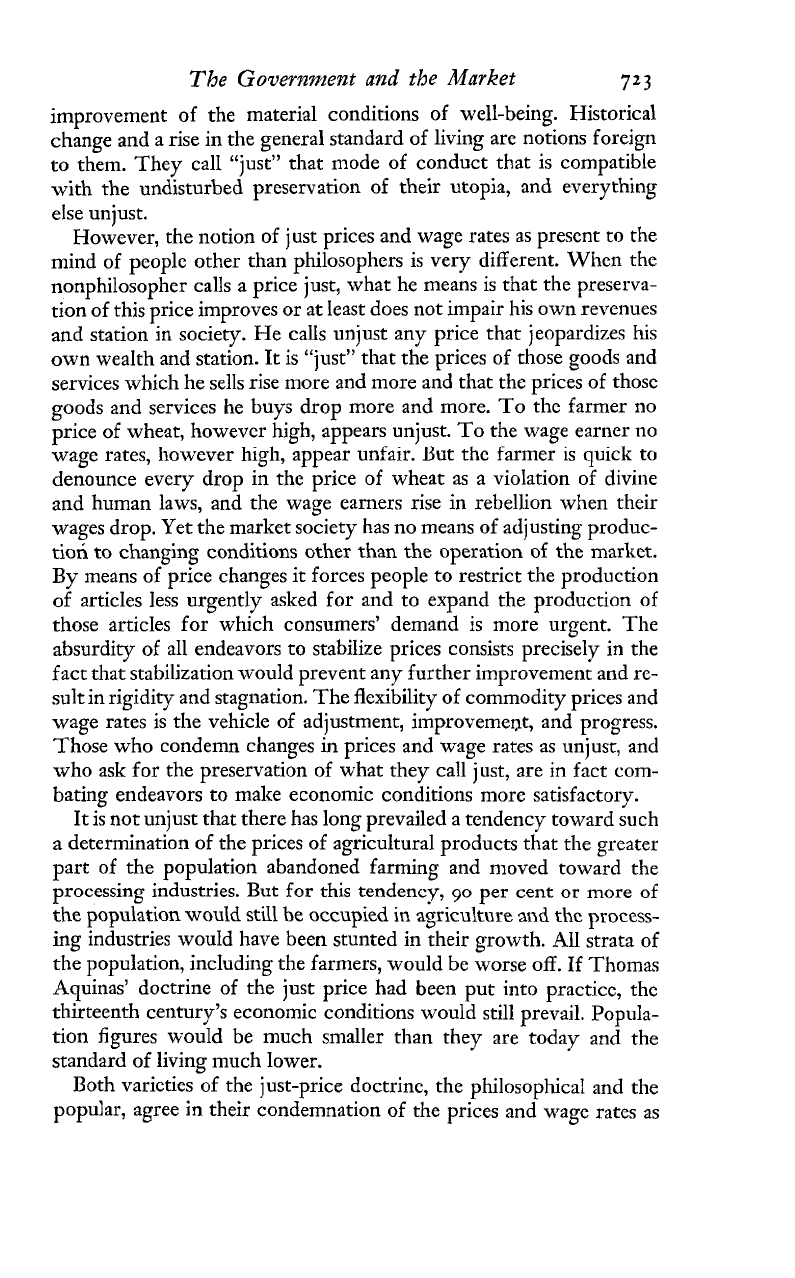
The
Governwzent and the Market
723
improvement of the material conditions of well-being. Historical
change and a rise
in
the general standard of living are notions foreign
to them. They calI "just" that mode of conduct that is compatible
with the undisturbed preservation of their utopia, and everything
else unjust.
However, the notion of just prices and wage rates as present to the
mind of people other than philosophers is very different. When the
nonphilosopher calls a price just, what he means is that the preserva-
tion of this price improves or at least does not impair his own revenues
and station in society. He calls unjust any price that jeopardizes his
own wealth and station. It is "just" that the prices of those goods and
services which he sells rise more and more and that the prices of those
goods and services he buys drop more and more. To the farmer no
price of wheat, howevcr high, appears unjust. To the wage earner no
wage rates, however high, appear unfair. But the farmer is quick to
denounce every drop in the price of wheat as a violation of divine
and human laws, and the wage earners rise in rebellion when their
wages drop. Yet the market society has no means of adjusting produc-
tion to changing conditions other than the operation of the market.
By means of price changes
it
forces people to restrict the production
of articles less urgently asked for and to expand the production of
those articles for which consumers' demand
is
more urgent. The
absurdity of a11 endeavors to stabilize prices consists precisely in the
fact that stabilization would prevent any further improvement and re-
sult in rigidity and stagnation. The flexibility of commodity prices and
wage rates is the vehicle of adjustment, improveme~t, and progress.
Those who condemn changes in prices and wage rates as unjust, and
who ask for the preservation of what they call just, are in fact com-
bating endeavors to make economic conditions more satisfactory.
It is not unjust that there has long prevailed a tendency toward such
a determination of the prices of agricultural products that the greater
part of the population abandoned farming and moved toward the
processing industries. But for this tendency, 90 per cent or more of
the population would still
be
occupied
in
airiculture
and
the process-
ing industries would have been stunted in their growth. All strata of
the population, including the farmers, would be worse off. If Thomas
Aquinas' doctrine of the just price had been put into practice, the
thirteenth century's economic conditions would still prevail. Popula-
tion figures would be much smaller than they are today and the
standard of living much lower.
Both varicties of the just-price doctrine, the philosophical and the
popular, agree in their condemnation of the prices and wage rates as
